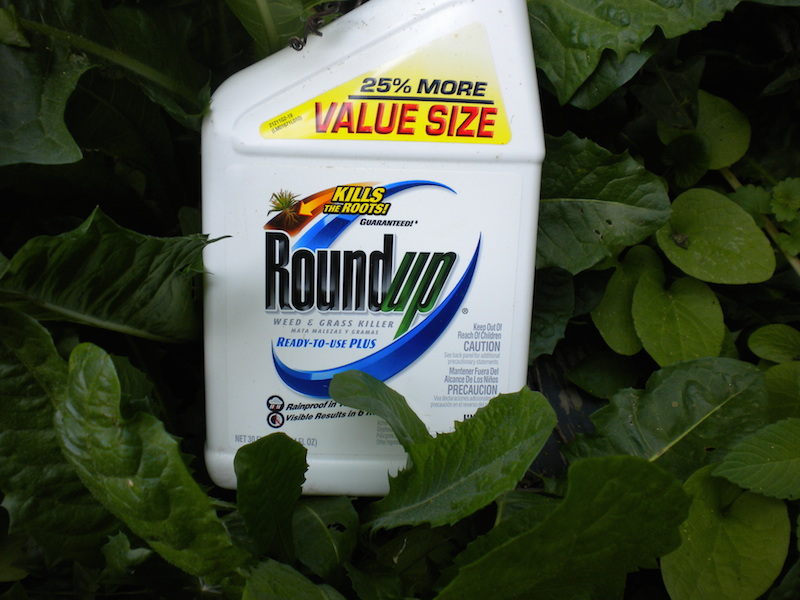The use of glyphosate has surged dramatically since the 1990s, when genetically engineered (GE) “Roundup Ready” corn and soybean crops were introduced. According to the Pesticide Action Network of North America (PANNA), evidence suggests that glyphosate can activate the estrogen receptor in a breast cancer cell line, which means it may be able to mimic the function of the key sex hormone estrogen. Researchers also documented oxidative stress and other subchronic impacts on liver enzymes in rodent models. Oxidative stress can lead to the production of compounds toxic to cells, and/or decrease the body’s ability to detoxify biologically active and damaging compounds. Finally, a range of other health impacts from glyphosate observed in non-mammalian models include retardation of larval development in oysters, adverse developmental effects affecting head formation in frog and chicken embryos, and altered gene activity in fish livers, suggesting potential for damage.
Please join us in speaking out that glyphosate should stay on the Prop 65 statewide list of chemicals that must be labeled for use in food, air, water, or soils. The deadline to comment is October 20, 2015.
To comment, copy and paste the email below, personalize it, and send it with the subject line “NOIL – Glyphosate, Tetrachlorvinphos, Parathion, Malathion: YES – Add to Prop 65 List” to Esther Barajas-Ochoa at the Office of Environmental Health Hazard Assessment: P65Public.comments@oehha.ca.gov.
[Date]
Ms. Esther Barajas-Ochoa
Office of Environmental Health Hazard Assessment
P. O. Box 4010, MS-19B
Sacramento, CA 95812-4010
Fax: (916) 323-2265
Phone: (916) 445-6900
Email: P65Public.comments@oehha.ca.gov
RE NOIL: GLYPHOSATE, TETRACHLORVINPHOS, PARATHION, MALATHION
Dear Ms. Barajas-Ochoa:
I (my organization) strongly support OEHHA’s Notice of Intent Letter (NOIL) to add Glyphosate (both an antibiotic and an herbicide) and Malathion as Group 2A (probable carcinogen to humans), and Tetrachlorvinphos and parathion as Group 2B (possible carcinogen to humans) to California’s Proposition 65 list.
The March 2015 finding by the World Health Organization’s International Agency for Research on Cancer (IARC) that Glyphosate is a probable carcinogen to humans is validated by overwhelming scientific evidence of Glyphosate toxicity across the globe. IARC also concludes there is sufficient evidence of carcinogenicity of these four chemicals in experimental animals. According to IARC report author, Professor Christopher Portier, “Glyphosate is definitely genotoxic. There is no doubt in my mind.”
Since its introduction in the marketplace in 1974, Glyphosate rapidly became the world’s most popular herbicide, with accelerated expansion of its use following the introduction of genetically modified, glyphosate-tolerant crops in the 1990s. According to the latest estimates, 85% of GM crops are herbicide-tolerant, with glyphosate-tolerant crops comprising a majority of those planted. As of May 2015, a total of 137 glyphosate-tolerant varieties have been approved, including cotton, soybean, and maize, wheat, sugar beet, potato, Polish canola, and more.
According to the International Service for the Acquisition of Agri-Biotech Applications (ISAAA), “18 million farmers in 28 countries planted more than 181 million hectares of GM crops in 2014, up from 175 million hectares of GM crops in 27 countries in 2013.”
Globally, Glyphosate is a key ingredient in more than 700 products and is also used to control weeds in gardens, along roadsides, on schoolyards, in commercial and residential areas, and on millions of acres of farmland. In recent years, Glyphosate-resistant weeds, known as “Super Weeds”, have become prevalent, causing crop losses while extracting excessive water and nutrients from soils. Additionally, the U.S. Geological Survey (USGS) routinely finds glyphosate in U.S. waterways, especially in the Midwestern states and the Mississippi River Valley.[i]
The repeated industry claim that Glyphosate has no negative health effects on humans has allowed this toxin to poison our soil, water, air, and food, even though existing evidence has revealed both carcinogenicity and teratogenicity as far back as the 1980s. This has been hidden by industry fraud with the support of government bodies, as we watch the health of our nation decline in direct correlation with the spike in its use. This is a crime of omission against humanity.
With Glyphosate’s increasing lack of efficacy, coupled with rising awareness of its toxicity, people and nations across the globe are taking action to rid Glyphosate from their farms, their food, and their land, air, and water.
Thank you for recognizing the long-overdue urgency to mandate adding this deadly chemical to the Prop 65 statewide list. Thank you, at the Office of Environmental Health Hazard Assessment, for your integrity in giving credence to the overwhelming evidence of glyphosate toxicity now being brought to light across the globe, with ever-accelerating, alarming reports of steep rises in cancer, birth defects, and other serious illnesses, as use of glyphosate and the three other above-named chemicals increases.
Sincerely,
[your name, organization name]
[Your city, state, address]
[Your phone]
[Your email address]






